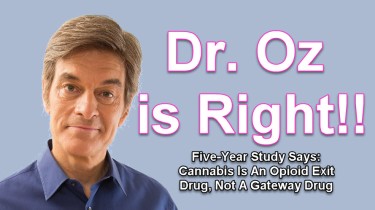
MMJ patients report using fewer opioids and alcohol, but they don’t tell their doctor about cannabis, a new study says
MMJ patients report using less opioids and alcohol, a new study says
But why don’t they tell their doctors about it?
Opioid medications are often self-prescribed by doctors to treat pain, especially in severe cases. Tramadol, fentanyl, and morphine are the most commonly used opioids, but while effective in treating pain, they have also been abused and abused without medical supervision.
With over 50 million Americans struggling with chronic pain that can often be so debilitating that it doesn’t prevent anyone from living a normal life, we need a safe solution to their treatment.
This has led to an opioid epidemic not only in the United States but worldwide. According to the World Health Organization, half a million deaths are caused by drug use, while over 70% of them are linked to opioid abuse. Over 30% of these deaths are due to opioid overdoses, which could easily have been prevented. But because of the addictive quality of opioids, many patients become addicted—meaning they use more than they need to. The dangerous part is that overdosing is far too easy as there is a fine line between a normal dose and an overdose – a single misjudgment can be fatal. But with more than 62 million opioid users around the world, where do we even begin treatment?
Additionally, alcohol is a controlled substance, yet so easily accessible even to youngsters, which is why so many people tend to abuse alcohol. Alcohol is so ingrained in our culture that no one even bats an eyelid when people want to go out for a drink after work because of a stressful day. Yet alcohol kills three million people worldwide every year.
You know something is wrong with society when things that kill us are easily accessible and misused.
In that regard, the legalization of cannabis has been a lifesaver, at least where it’s already legal. The data tells us that people in places where marijuana has been legalized and where medical marijuana patients have access to their safe and natural medicine are choosing to use fewer opioids and alcohol.
A recent study from Canada showed that nearly one in two medical marijuana patients were able to either stop or reduce their use of alcohol and opioids. The researchers, who hailed from both the United States and Canada, surveyed about 3,000 patients enrolled in the country’s federal medical marijuana program. Recreational marijuana has been legal there since 2018, while medical cannabis has been legal since 2001.
Researchers reported that 47% of respondents admitted to using marijuana instead of other controlled substances. Among those who reported using marijuana instead of prescription drugs, half of them reported using it instead of opioids. Several respondents also admitted to using cannabis to reduce their alcohol consumption. Also interesting was that about a third of those surveyed did not tell GPs that they were actually substituting medications, which can be dangerous, given that alcohol and opioid addiction cessation requires medical supervision and mixing can be dangerous for you.
“This study examined communication patterns between patients and providers regarding cannabis use and substitution in Canada,” the authors concluded. “Results suggest that patients often substitute other medications for cannabis without the guidance of PCPs (primary care providers). The lack of integration between universal health care and medical cannabis could likely be improved with improved medical education and clinical experience,” they add.
“Future studies should explore strategies for effectively involving primary care physicians in patient care around medical cannabis, with a particular focus on substitution and harm reduction practices,” they add.
The problem with the federal status of cannabis
Given the effectiveness of cannabis in treating pain, do we still have to prescribe opioids to patients and risk their death?
Many common pain relievers, including opioids, simply don’t work well at relieving pain and have serious side effects. Fortunately, not only in the United States but also in other countries, there is a movement to decriminalize cannabis so that patients can use it for pain as well as many other conditions. There is strong scientific evidence that cannabinoids are effective in treating pain and other difficult-to-treat conditions like epilepsy and PTSD. The problem is that there are still many medical professionals who are suspicious of marijuana, largely because it’s still a Schedule I substance in the United States.
Even if cannabis could be prescribed by doctors, we still lack enough data on how much should be recommended and what route of administration works best. However, we do have studies that can point us in the right direction, but often patients end up self-medicating and refusing to tell their GP that they are using cannabis because of its legal status.
Nothing makes sense as long as cannabis is a Schedule I substance while synthetic cannabinoids and extracts are delisted from Schedule III. Getting marijuana back on the market would empower physicians and medical professionals who want to help patients find a safe solution to treat their pain with a reliable dose and formulation. It also doesn’t make sense that patients who visit pain clinics in the US should be prescribed opioids and then be discharged if they test positive for marijuana.
After all, why are we even allowing drug companies to market opioids as if they work? The evidence is there – these dangerous drugs don’t work well and pose a serious threat to our lives and society as a whole.
LEGALIZED OPIOID DROPS, READ MORE…

DR. OZ SAYS CANNABIS PEOPLE GET FROM OPIOIDS, HE PROVED RIGHT!

Post a comment: